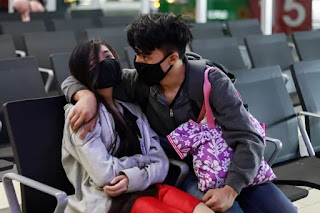Figures for vaccinating all poorest countries is based on countries defined as ‘Low Income’, for which the population is 775,710,612 (according to UN Population 2020). The average vaccine cost, $19, is based on the average mid-range cost per course of vaccination of the 5 leading vaccine producers. However, the prices should be far lower and the $19 is for illustration purposes and is in no way an endorsement of these unacceptably high prices. The wealth of the new billionaires could vaccine all Low-Income countries 1.3 times. The population of India (according to UN Population 2020) is 1.38 billion and the increase in wealth of the 8 existing billionaires could vaccine everyone in India 1.2 times. All figures based on a two-dose regimen. Vaccine doses in low income countries data from Our World in Data.
At least nine people have become new billionaires since the beginning of the COVID pandemic, thanks to the excessive profits pharmaceutical corporations with monopolies on COVID vaccines are making, The People’s Vaccine Alliance revealed today ahead of a G20 leaders Global Health Summit.
The 9 new vaccine billionaires, in order of their net worth are:
- Stéphane Bancel, Moderna’s CEO (worth $4.3 billion)
- Ugur Sahin, CEO and co-founder of BioNTech (worth $4 billion)
- Timothy Springer, an immunologist and founding investor of Moderna (worth $2.2bn)
- Noubar Afeyan, Moderna’s Chairman (worth $1.9 billion)
- Juan Lopez-Belmonte, Chairman of ROVI, a company with a deal to manufacture and package the Moderna vaccine (worth $1.8 billion)
- Robert Langer, a scientist and founding investor in Moderna (worth $1.6 billion)
- Zhu Tao, co-founder and chief scientific officer at CanSino Biologics (worth $1.3 billion)
- Qiu Dongxu, co-founder and senior vice president at CanSino Biologics (worth $1.2)
- Mao Huihua, also co-founder and senior vice president at CanSino Biologics (worth $1 billion)
Topping the list of new billionaires who have cashed in on the success of COVID vaccines are the CEOs of Moderna and BioNTech, each with a wealth over $4 billion or more. The list also includes two of Moderna’s founding investors and the company’s chair as well as the CEO of a company with a deal to manufacture and package the Moderna vaccine. This is despite the fact the vast majority of funding for the Moderna vaccine was paid for by taxpayers. The final three new vaccine billionaires are all co-founders of the Chinese vaccine company CanSino Biologics.
The rights to manufacture vaccines are currently held by a small group of pharmaceutical companies making extraordinary profits by controlling the global supply. While over 1.74 billion vaccine doses have been administered worldwide, the difference in vaccination programmes between countries is stark, with dozens –- including Madagascar, Nicaragua, Cuba, Chad, Burkina Faso, Burundi, Eritrea, and Tanzania -- yet to report a single jab being delivered.
I have a new morning alarm these days: the alert on my phone to book a COVID vaccine. It’s the same routine every day. Within seconds of trying to book an appointment, I am told there are “0 slots”. Securing a vaccine in India is an impossible game of fastest finger first.
But this game is only for people like me in urban India with access to technology. Even with these benefits, there is no guarantee that I will get a jab because of the extreme shortages of vaccines.
The rights to manufacture vaccines are currently held by a small group of pharmaceutical companies making extraordinary profits by controlling the global supply. While over 1.74 billion vaccine doses have been administered worldwide, the difference in vaccination programmes between countries is stark, with dozens –- including Madagascar, Nicaragua, Cuba, Chad, Burkina Faso, Burundi, Eritrea, and Tanzania -- yet to report a single jab being delivered.
India’s second wave is still ravaging the country, pushing hospitals and people to a breaking point. It will take a generation to recover from what we’ve seen in our communities, our hospitals and our families. Shortage of oxygen, hospital beds, overburdened crematoriums and crumbling public health infrastructure have left my country gasping for breath.
For the past few months, I’ve been on late-night calls trying to help the sick get hold of oxygen, a hospital bed or COVID medication. There are thousands of volunteers, mostly young, working around the clock to help their communities and families. For them, and for myself, the constant sense of devastation when the people we are trying to help don’t make it is taking its toll.
This nightmare can quickly spread. The so-called Indian variant is between 30% to 100% more transmissible than the UK variant and is now present in 44 countries worldwide. With new variants emerging, we cannot end the pandemic without vaccinating the whole world.
In the United States, 50 per cent of the population has received at least one vaccine dose. India has administered the first dose to only 11 per cent of its population. Meanwhile, Africa has the slowest vaccination rate of any continents, with some African countries yet to start mass vaccination campaigns. According to the World Health Organization (WHO), 87 per cent of vaccine supply has gone to higher-income countries.
















